The EPS camp believes that the BJP was already arm-twisting the AIADMK into conceding more seats in the 2024 Lok Sabha elections 'than they deserve' observes N Sathiya Moorthy.
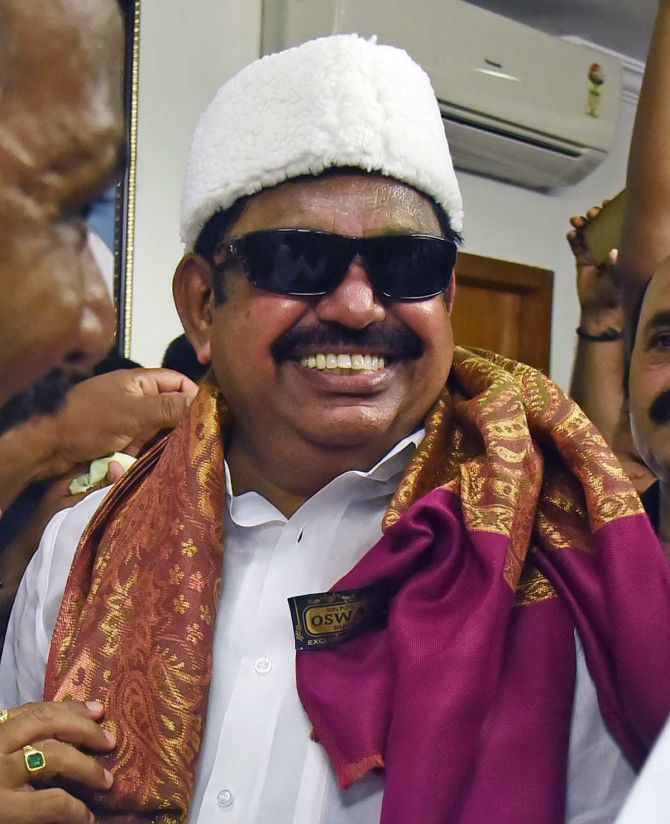
Now that Opposition AIADMK in Tamil Nadu has anointed former chief minister Edappadi K Palaniswami (EPS) as general secretary following a Madras high court verdict, the party reverts to the original practice of having just one supreme leader at the top.
As if to prove the point, a party worker also adorned EPS with what is known as 'Brand MGR' cap and dark glasses, which, however, did not go down well with a section of the early cadres from the seventies and eighties.
The high court did refer to four pending civil cases in the lower courts.
Three-time chief minister O Panneerselvam who lost his post as party coordinator and aides have already moved a division bench to obtain a stay of the single judge verdict.
Justice Kumaresh Babu, who on Tuesday, March 28, 2023, upheld the legality of the July 11, 2022 party general council meeting last year called by the EPS camp (citing the massive majority he enjoyed in the general council), however, did not approve of the way OPS and aides were thrown out of the party without serving them show cause notices, as mandated in the party by-laws.
With the high court verdict in hand, the party's election officers declared the results of the general secretary's election, in which EPS was the only nominee.
They had held back the announcement, as directed by the high court, pending Tuesday's verdict.
The election itself was an add-on situation in recent weeks, for the OPS camp to challenge in the court.
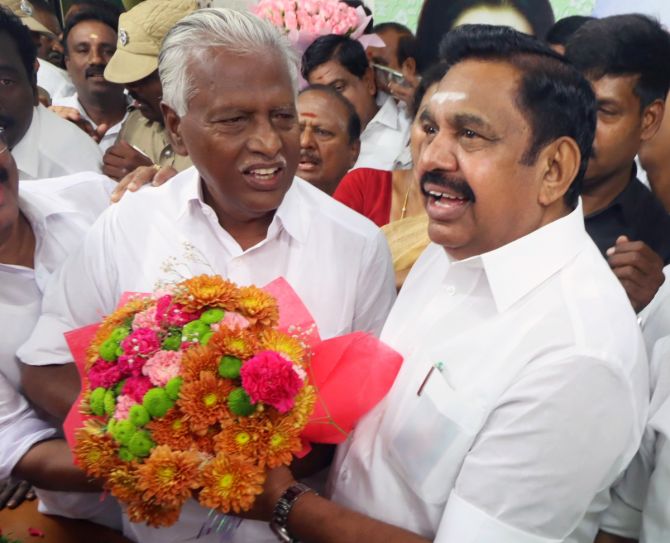
EPS is now the seventh general secretary of the party. Between MGR and his latter-day heir-apparent Jayalalithaa Jayaram, there were three others holding that position, all chosen by the party founder.
They were V R Nedunchnezhiyan, who was the 'Eternal No 2' in Dravidian party governments, P U Shanmugam and one-time trade union leader S Raghavanandam, before MGR took it back.
Of them, Raghavanandam, in his mid-seventies, had the distinction of attributing his post exclusively to jumping queues and paying black-market rates to view MGR movies, first-day-first-show. MGR chided him first and later removed him.
The AIADMK is possibly the one party of its size, popularity and acceptance in the country, where leadership succession became a huge political and legal issue, and remains so even seven years after the death of the last popular leader, late chief minister Jayalalithaa.
Yes, the party general council did unanimously choose Jaya's on-again-off-again confidante, Sasikala Natarajan, as the sixth general secretary succeeding her.
The occasion was marked by OPS as chief minister in his third and last of short terms, and other leaders falling at her feet and 'pleading' with her to accept the position, at Jaya's Poes Garden residence, where she continued to reside at the time. The rest is all history, contrived some, convoluted others, and confusing, all.
It is interesting to recall what Jaya reportedly told then BJP president L K Advani at a dinner at his house.
As chief minister, Jaya was in Delhi to attend the National Integration Council meeting (2012).
She said: 'Mine in a party of defectors, beginning with the way MGR walked out of the DMK to found the AIADMK...The rest of them ditched DMK and Karunanidhi when the going was good for MGR....'
EPS, by abandoning Sasikala, who made him CM purely out of trust, not love or ability, when acting governor C Vidyasagar Rao would not swear her in as CM pending the anticipated Supreme Court verdict in the 'assets case' against Jaya, has that unique qualification that others of his generation in the party do not possess.
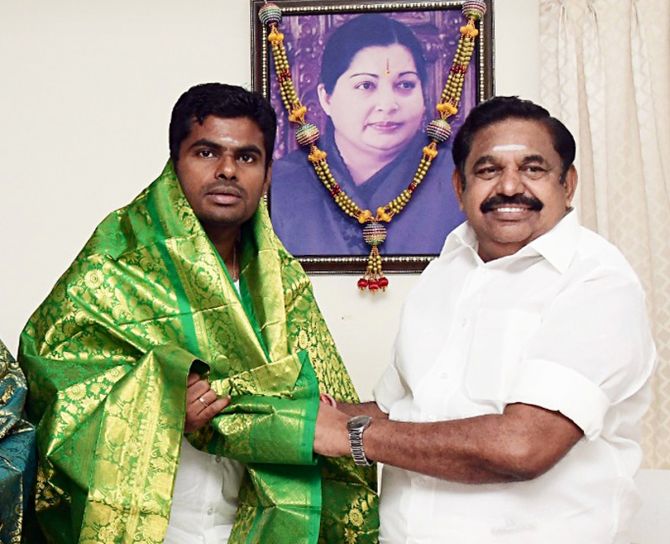
Truth be acknowledged, EPS's legal battles are not yet over.
More importantly, it remains to be seen how the Election Commission and the courts react if OPS were also to contest the allotment of the party's 'Two Leaves' poll symbol to the 'official/officiating' rival, now designated as AIADMK.
Thereby hangs a tale as EPS's cadres believe that the ruling BJP at the Centre may not seek to persuade their leader any more to patch up with the other, citing the alliance debacle in the 2019 Lok Sabha elections and 2021 assembly polls.
The EPS camp also believes that the BJP was already but silently arm-twisting the party into conceding more seats for the national ally in the Lok Sabha polls next year 'than they deserve'.
However, AIADMK cadres, the second-line and even the top leadership, are convinced that the party's poor showing in the 2019 lOK sABHA polls owed only to the BJP alliance, as not just the minorities and Dalits in the state but even a substantial number of traditional AIADMK voters in the western stronghold, for instance, turned against the party.
In the Lok Sabha polls next year, which they claim they have a better chance to win, owing to the inevitable 'anti-incumbency' already hurting the ruling DMK rival, issues like the 'Rahul Gandhi disqualification' would be central to the poll campaign in the state with its 'enlightened voters'.
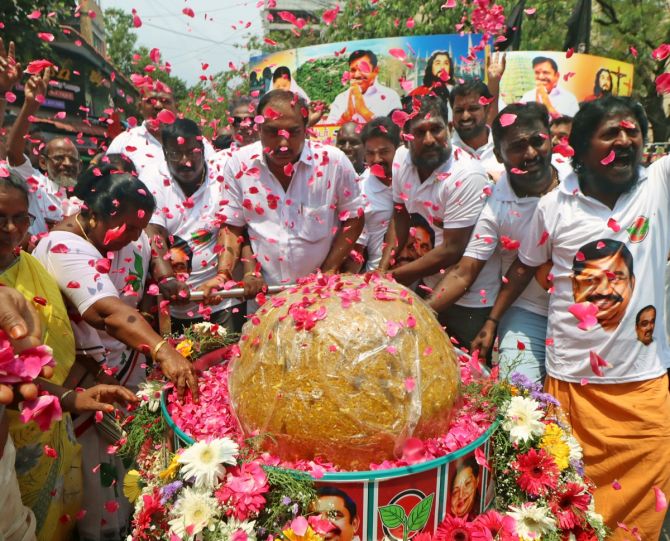
Even without it, the AIADMK is feeling increasingly uncomfortable with state BJP chief K Annamalai, a former IPS officer from the Karnataka cadre, being unsparing in his attacks on the party governments in the past as much as he targets the common DMK rival.
Though they concede that they are not the ones to tell the BJP high command what to do, their fear is that the way Annamalai is conducting the affairs of the state unit, and the way he has been antagonising and sidelining party veterans, and getting caught in one internal controversy after another, may upset the alliance in election time.
It is likely that Annamalai thinks that to be a successful leader in 'Dravidian' Tamil Nadu, one would also have to act tough, and be seen as doing so.
If so, it is a misnomer, to say the least. Worse still, if there has to be a functional alliance with the AIADMK in elections 2024, then he would have to go.
EPS cannot be replaced at the other end, after all, and the two do not gel well.
The state BJP, though it is going slow after the recent ruckus between the two parties, is not saying anything in public, as yet.
They point to the way EPS targeted OPS in his party, and argue that he was not the one to preach them on inner-party democracy and the like.
However, sections within the state BJP also feel they would be better off without allies of the AIADMK kind though they might still accommodate smaller parties like the PMK and DMDK as in 2014.
It is another matter that the PMK has a proven five per cent vote-share against the lesser figures of even the BJP, leave aside the DMDK and the rest.
Some BJP strategists argue how in a three-cornered contest (alone) the BJP has won the southern-most Kanyakumari seat, for instance.
Under Narendra Modi's vibrant leadership, the party can take it back again and also win a few more in the south, west and also in Chennai city, if it contested alone -- or, so goes the argument.
Accordingly, there is some truth in the AIADMK argument that 'minorities' do not vote them at all when in the BJP's company. Without the BJP, those like the VCK, now in the DMK-Congress alliance, may cross over to the AIADMK side.
This section in the BJP wants the high command to consider the AIADMK's position of an alliance minus their party as a winning electoral strategy for 2024, and re-admit the other into the NDA, post-poll, if and if only required.
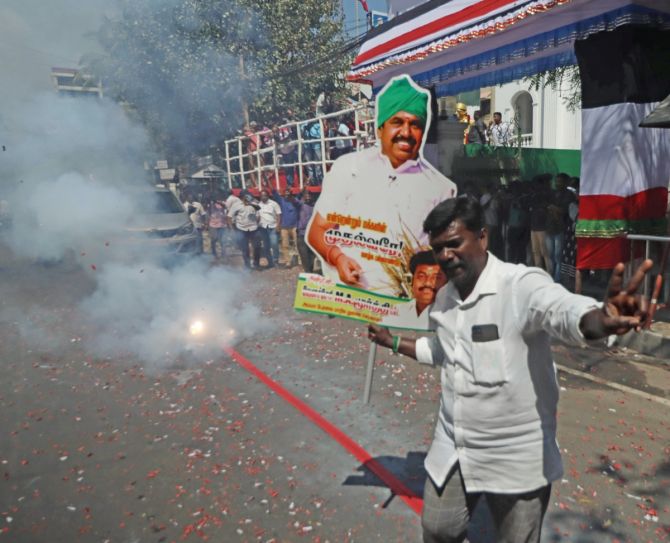
Tamil Nadu has always voted for strong leaders.
The post-Independence woes of the ruling Congress ended only when a strong leader Kamaraj, with his feel for the masses, became chief minister in 1954, after Gandhiji had sidelined his mentor S Sathyamurthy in favour of his friend, Rajaji, in the pre-Independence era.
As a tall leader with administrative achievements to his credit, Kamaraj dwarfed successor M Bhaktavatsalam, when he himself went to Delhi as AICC president in 1963.
This was among the reasons attributed for the party's historic electoral defeat in 1967.
The successor DMK always had a strong leader in founder C N Annadurai, whose chief ministerial term ended with his death in early 1969.
Successor M Karunanidhi was kind of propped up by MGR and others.
Having grown up with the rest of them all in the up and coming DMK since its inception in 1949, Karunanidhi could not but be accommodative towards friends and foes allies -- until he struck at MGR, and removed the actor-politician from the party.
Then came the AIADMK where MGR as the founder and the state's single-most charismatic leader of all time, reigned, unquestioned.
Jayalalithaa was cut from the same cloth as MGR, having been trained and equipped by him to be his un-anointed successor after his time.
Both were tough leaders within the party and made unpredictability their hallmark.
The other three general secretaries between these two tall leaders were passengers.
Sasikala, post-Jaya, had the ambitions and also toughness and unpredictability, but time after all was not on her side. Now, she is passe.
Against this background, EPS has proved that he is tough and determined, though not as charismatic and unpredictable as the other two -- at least not as yet.
Here, he may have a visible and plausible advantage even over DMK rival and Chief Minister M K Stalin.
Father Karunanidhi having fought all his succession battles, including those against Vaiko (founder of then breakaway MDMK) and estranged elder brother M K Azhagiri, in the last decade, not to leave out late cousin Murasoli Maran, who was domineering without aspiring for the top slot, Stalin is too civil for the party's comfort.
He seemingly lacks the 'killer instinct', not that Karunanidhi had it in as abundant measure as MGR and Jayalalithaa in their times.
So much so, a time came when even male voters unabashedly backed Jaya and voted for the AIADMK, independent of the moral high ground they otherwise took in matters politics.
To a whole generation of Tamil women, who were getting better education, employment and exposure, bottom up, 'Amma' became their role-model.
The voter's perception that the OPS-EPS duo were quivering before the ruling BJP at the Centre, independent of basic policy differences, was among the reasons that they preferred the DMK, where Stalin's writ (alone) ran.
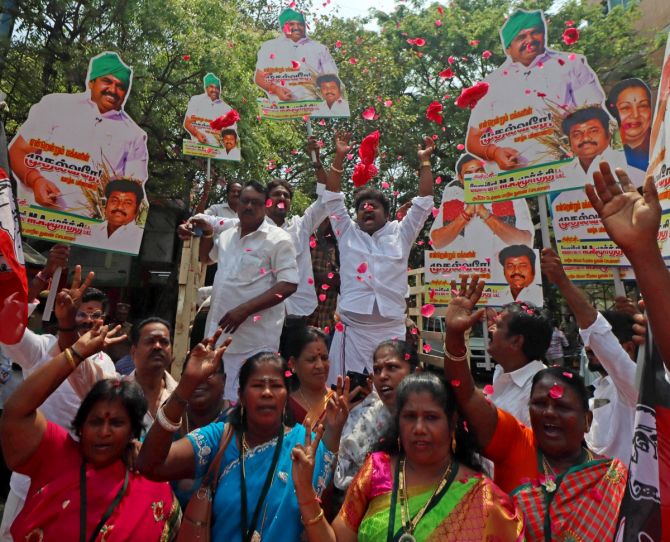
Despite the inevitability of anti-incumbency spreading its shadow across the DMK's future electoral performance, Stalin's perceived inability to control ministerial colleagues who are seniors to him in the party or belong to the same generation, is telling upon his personal reputation as a leader who (still) wants to do good.
Social media posts of their loose talk before the camera has embarrassed the leadership successively, but a repeat of the same by the same or other ministers and office-bearers at all levels has given the impression that Stalin's writ does not run, or, he has not acquired Karunanidhi's cult status as yet, or both, for the rest of them to respect him, if not be afraid of him, as with rivals MGR and Jayalalithaa.
If left un-reversed, the perception of Stalin's laid-back attitude could work to the DMK'S electoral disadvantageand to the advantage of the AIADMK rival.
If that happens, EPS would have won the day for his party -- and there would be no going back, at least for his leadership at the helm, a chance choice even under the best of circumstances.
N Sathiya Moorthy, veteran journalist and author, is a Chennai-based policy analyst and political commentator.
Feature Presentation: Rajesh Alva/Rediff.com



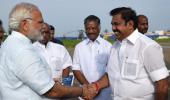








 © 2025
© 2025